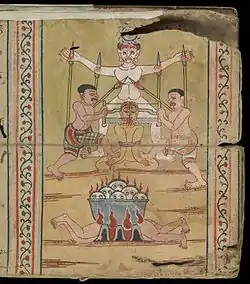เปรต
Thai

1: preta being punished by underworld officials

2: monks inspecting a preta
Etymology
From Sanskrit प्रेत (preta, “dead body; dead person; ghost; etc”, literally “one who has gone; one who has departed; one who has passed away”).[1] Cognate with English preta; Lao ເຜດ (phēt); Old Khmer preta; Modern Khmer ប្រេត (praet).
Pronunciation
| Orthographic | เปรต e p r t | |
| Phonemic | เปฺรด e p ̥ r ɗ | |
| Romanization | Paiboon | bprèet |
| Royal Institute | pret | |
| (standard) IPA(key) | /preːt̚˨˩/(R) | |
Noun
เปรต • (bprèet) (classifier ตน)
- (Buddhism, Hinduism) preta: a type of supernatural creature born to undergo punishment or suffering as a result of sinful deeds committed in previous lives.
- preta: a type of ghost in the Thai folklore, believed to have a very tall and thin body, the mouth as small as the hole of a needle, the hands as large as palm leaves, and to consume blood and pus as food, as well as to scream at night.
- (slang, sometimes considered vulgar, derogatory and offensive) very tall person.
- (slang, vulgar, derogatory, offensive) annoying, disturbing, or bothersome person; troublemaker.
Derived terms
- เด็กเปรต (dèk-bprèet, “brat”)
- ต้มเปรต (“eel soup”)
References
- ราชบัณฑิตยสภา (2015) กฎหมายตราสามดวง: พระธรรมสาตร และหลักอินทภาษ ฉบับราชบัณฑิตยสภา (in Thai), Bangkok: ราชบัณฑิตยสภา, →ISBN, page 93: “เปรต ตามรูปศัพท์หมายถึง ผู้ไปก่อน, ผู้ที่ตายไปแล้ว ในที่นี้หมายถึง มนุษย์ผู้ซึ่งทำบาปและไปเกิดเป็นวิมานิกเปรต (เปรตที่ควักเนื้อตัวเองกิน).”
This article is issued from Wiktionary. The text is licensed under Creative Commons - Attribution - Sharealike. Additional terms may apply for the media files.